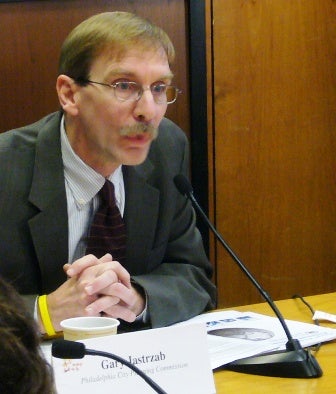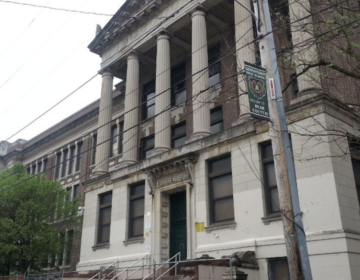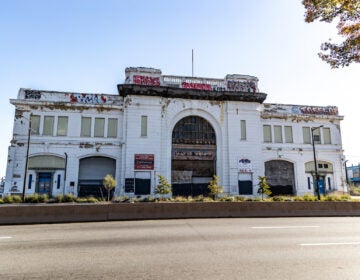Creating a preeminent planning commission

Gary Jastrzab, acting PCPC executive director
Andrew Altman sworn in as Deputy Mayor for Commerce and Economic Development
Jan. 31
By Thomas J. Walsh
For PlanPhilly
Observers of the Philadelphia City Planning Commission, along with more than a few insiders, are nothing short of effusive about Mayor Michael Nutter’s early attention and emphasis on the agency.
“I’ve compared it to the planets and the stars beginning to align,” said Gary Jastrzab, acting executive director and 27-year veteran of the Planning Commission staff. “It’s tremendously exciting. The support that the mayor has expressed for the need for planning and the importance of planning is music to our ears.”
“It’s just a story about great expectations,” said Alan Greenberger, a newly minted commissioner who is an architect and a principal at MGA Partners. “This is about putting the right team on the field and the mayor has been working very diligently at that – particularly with planning, zoning and development. He made that a priority in the campaign and in sequence with his appointments.”
Greenberger was referring to last week’s swearing in of Andrew Altman in the role of deputy mayor for planning and economic development and director of commerce. The newly-created position and the consolidation of Planning with Licenses & Inspections, the Historical Commission, the Office of Housing and Community Development and other agencies has drawn raves from city officials and developers.
“Hiring Andy was a key step toward making the Planning Commission preeminent,” said Rob Dubow, the city’s director of finance and a new planning commissioner. “There are a lot of reasons to combine [those agencies]. In the long run it’ll improve service and let government run more efficiently.”
In a 10-page campaign position paper on zoning and planning reform, Nutter said he’d “re-establish the Planning Commission as the nation’s preeminent city planning agency.”
Dubow said he’d like to get started with some basics, like addressing the city’s infrastructure. “We probably need to figure out ways to invest more in our streets, bridges and city facilities. There are just a lot of issues with years of underinvestment” and the results of that neglect, he said. “There are things that we can address more immediately, and things that’ll take years.”
As a longtime staffer, Jastrzab would likely not argue with that assessment, but he didn’t dwell on the past – only allowing “what [planning] means in municipal government is very much a function of what a mayor’s interest in planning is” – and that the mayors he has served under have had “different personal interests.” While his department has been seen as working mostly from the sidelines during the last three decades, he said the agency has been quietly but efficiently shepherding major changes in zoning and master plans. His tenure has included major civic developments such as the linking of regional rail lines through Center City’s commuter tunnel; substantial changes to the Independence Mall area; and housing booms that have brought vibrancy to neighborhoods from Bella Vista to Manayunk and Fishtown to University City.
On the money
Still, a reputation goes a long way. “The Planning Commission takes a lot of time if you want to do it properly. It will take a while for the planning to catch up with the pace of the city,” said Walt D’Alessio, a longtime Center City real estate executive who has had a hand in most of the city’s major developments since the 1970s. A board member at two prominent area developers – Brandywine Realty Trust and Liberty Property Trust – D’Alessio has been a prime mover at the Philadelphia Industrial Development Corp., among other city agencies and business organizations. He was a city planning student and was drawn to Philadelphia after graduate school because of its national stature as ground zero for the country’s urban renewal movement.
As for the commission these days, he sees no place to go but up: “It was in the hands of crazy people.” He said the role of the commission was no longer recognizable when standard planning strategies, like eight-year capitalization programs, became a thing of the past. “It wasn’t the developers. It was the mayors. If you were a developer you had no reason to go to the Planning Commission. The context of the broad plan is what went away.”
What might be worse than that, D’Alessio said, is being too broad. He is critical of what he calls “exercises” that are fun to ponder but that have no practical basis in reality. In this he includes some of the thinking espoused by PennPraxis. Burying Interstate 95 along the central Delaware River waterfront to create a more accessible Penn’s Landing is an example. “There’s not enough money in the universe for that,” he quipped.
He drew financial distinctions that went further than the normal line between public and private concerns. “The investment community is more important than the developers,” he said, explaining that condominiums or office towers can be planned or zoned, but neither would happen if changes are made to planning policies that drive away institutional real estate investors or banks that finance municipal bonds. “A revitalized Planning Commission has to realize it is setting the framework, and the city has to hold up its end” by the proper management of water resources, streets and infrastructure.
Anything that would staunch the flow of investment into Philadelphia’s economic development, or stall the progress the city has made since the 1990s, D’Alessio said, “would be disastrous.”
Code for impact
Terry Gillen, Nutter’s senior adviser for economic development and a veteran of the PIDC, where she ran the city’s conversion efforts at the former Navy Yard, would not comment on any perceived tensions between developers and planners.
She expressed confidence, though, in Nutter’s ambitions to turn the Planning Commission into a relevant agency again. “I think it’ll be playing a more central role in large city projects. I think that’s just going to be the biggest difference,” she said.
Steve Wray, executive director of the Economy League of Greater Philadelphia, said that a strong Planning Commission would go a long way toward accommodating 21st century business activities.
“Our half-century-old plan didn’t envision telecommuting, or small, specialized, clean manufacturing facilities,” Wray said. “Many of the economic impacts will be hard to estimate until the code is written.”
The Zoning Code Commission has already started that process, with a team that includes Susan O.W. Jaffe, whom Nutter named as chair of a wholly new Zoning Board of Adjustment.
“A reinvigorated Planning Commission and a modernized zoning code creates predictability for investors in Philadelphia,” Wray said, “whether they be developers or homeowners.”
Wray was not the only regional official to wax philosophical about the priority being placed again with the Planning Commission, the one made famous by the late Ed Bacon. And he was not alone in invoking legendary Chicago architect Daniel Burnham, who once said, “Make no little plans. They have no magic to stir men’s blood and probably will not themselves be realized.”
The reporter can be contacted at thomaswalsh1@gmail.com
WHYY is your source for fact-based, in-depth journalism and information. As a nonprofit organization, we rely on financial support from readers like you. Please give today.





